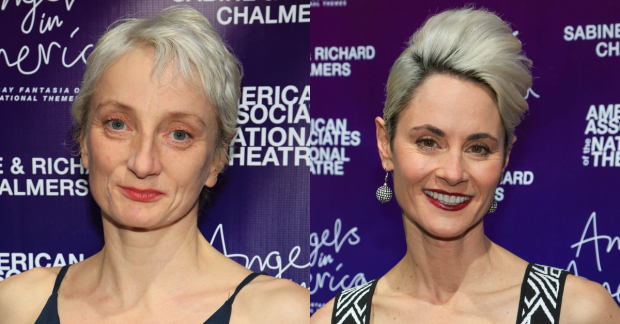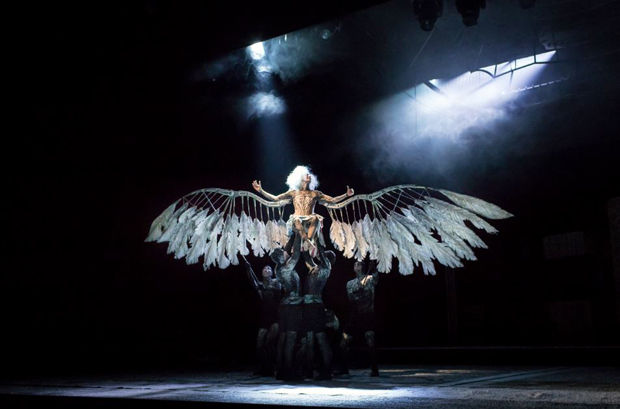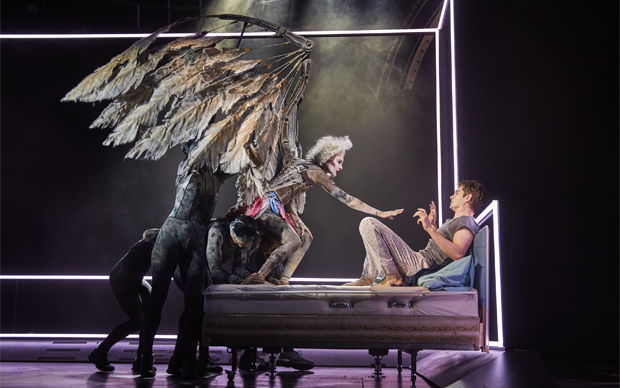Amanda Lawrence and Beth Malone Put the "Angels" in Angels in America
The cast of Tony Kushner's Angels in America at London's National Theatre recognized the enormous task ahead of them. Not only did they have just 12 weeks to discover the intricacies of two extremely complex plays (as well as put them on their feet), but tickets for the initial 2017 run of director Marianne Elliott's revival at London's National Theatre, which starred Nathan Lane as Roy Cohn and Andrew Garfield as Prior Walter, sold out in a single morning.
"We were aware of high expectations," says Amanda Lawrence, who plays, among many roles, the Angel who crashes through Prior's ceiling at the end of part 1, Millennium Approaches. "It was a mammoth task and just hard work."
Given the reception of audiences and critics alike ("When Andrew Garfield said the line 'More life' at the end, the audience were up on their feet applauding," Lawrence remembers), Broadway was a no-brainer. Now running at the Neil Simon Theatre, Lawrence has begun sharing the role with Fun Home Tony nominee Beth Malone, who plays the Angel and others during Wednesday marathons and will take over the character full-time at the end of May.
Malone, too, felt the weight bearing down on her. She was desperate to land the role here, with the team that created War Horse, and to appear on Broadway in a play, "something where I just got cast because I can act." She endured five grueling callbacks, each time noticing the same two other actors going through a similarly intense cycle. "I have never felt more for people who I auditioned with than in this process," she adds.
With Angels in America ready to open on Sunday, March 25, Lawrence and Malone are offering audiences a play that feels like "medicine for people's ears." In Malone's dressing room, they explored how this 25-year-old play feels timelier than ever.

(© Tricia Baron)
This interview has been condensed and edited for clarity.
Amanda, when this company of British actors (and American actor Nathan Lane) performed Angels in America at the National, how did the UK audiences take to the play's discussions of Reagan politics, Mormonism, and other uniquely American subjects?
Amanda Lawrence: It's so fascinating. The way they listen in England is a different kind of listening. They're quieter. When Sue Brown did the Rabbi in London, audiences were just chuckling here and there. But there was something very different here. The first night Sue Brown did the Rabbi here, [you could feel] the connection in the audience, to places she mentions like Flatbush and Grand Concourse Avenue. You know every corner. At the end of that speech, I just thought, "This is your play."
Beth Malone: It's a love letter to New York, but it's not just America's play. It's a global piece. It’s for the world. It does have American themes, but it is really about the human condition and the time and place we are in on the planet right now, and what's going to happen to us.

(© Helen Maybanks)
How did the physicality of the Angel — the fact that the angel is physically lifted by figures called "Shadows" and not flown in on wires — develop over the course of rehearsals in London? And how has it grown and morphed for the Broadway production?
Amanda: It was early on that Marianne decided on the Shadows with puppetry director Finn Caldwell. Finn talked a lot in rehearsals about how the Angel is not fixed in flying; the wings could separate and move you to a different part of the room. The "Shadows" are not just lifting you, they're part of the Angel's energy. They move with you. We did a lot of work in London and here on lifting and falling and trusting. The Shadows in the London production couldn't come because of union stuff, so it's been reinvented, and it's really exciting to do it differently.
Beth: It's a lot of work.
Amanda: A lot of work to try and find different ways of doing it. In England, I sometimes felt that there were things I wished I could be a bit freer with. You have to listen hard to know what the Angel is saying. How do we keep this balance of movement, this extraordinary flight in the air, but also get this message across? I feel like we've gotten there, but that's been a real challenge.
Speaking of getting the message across, what are the most important nuggets of wisdom that Tony Kushner has provided in this process?
Beth: There have been a lot of helpful things he's said, but the changes he's made to Perestroika are the most helpful. There are tweaks and cuts that have distilled it to a more actable level in this version. His mind is always running at hyper-warp speed, so you've got to be careful that the information he imparts to you is actable. It's like asking Baryshnikov how to do first position and he explains the history of ballet.
Amanda: The note he gave me the other day was, "The words are doing it. Just say the words." Communicate it. For me, it's getting that through and not clouding it too much.

(© Brinkhoff-Moegenburg)
What does Angels in America say about the world we're currently living in?
Beth: At the top of Perestroika, the Bolshevik comes out and frames it by saying, "The Great Question before us is: Are we doomed? The Great Question is: Will the Past release us? The Great Question before us is: Can We Change?" Those are the questions of our current time.
It's a terrible time, but Tony Kushner and this play maintain that there is hope to be found and that nothing is lost forever. The things that have gone terribly, terribly wrong are reversible and fixable. That is, I think, why this play is like medicine for people's ears. We want a way of making sense of the chaos and this play helps you understand how to do that.
Amanda: As Prior says, the world keeps spinning forward. We are not rocks. We have to keep moving and we can change things. It's powerful stuff.










